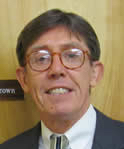Brown, B.: Difference between revisions
No edit summary |
m (Text replacement - "{{Footer}}" to "") |
||
| (9 intermediate revisions by 2 users not shown) | |||
| Line 1: | Line 1: | ||
{{Person | {{Person | ||
|HasDrlPage=Yes | |HasDrlPage=Yes | ||
|HasLibPage=Yes | |HasLibPage=Yes | ||
|HasBnwPage=Yes | |HasBnwPage=Yes | ||
|pagename=Brown, B. | |||
|PersonType=Professors Emeritus; Authors of English Works | |||
|images=File:Brian Edward Brown.jpg | |||
|namefirst=Brian | |namefirst=Brian | ||
|namemiddle=Edward | |namemiddle=Edward | ||
|namelast=Brown | |namelast=Brown | ||
|bio=Brian Edward Brown | |bio=Brian Edward Brown was an undergraduate and graduate student of Thomas Berry at Fordham University where he earned his doctorate in the History of Religions, specializing in Buddhist thought. He subsequently earned his doctorate in law from New York University. Currently he is Professor Emeritus of Religious Studies at Iona College, New Rochelle, N.Y. He is the co-founder of The Thomas Berry Forum for Ecological Dialogue at Iona as well as being one of the founding faculty of the Integral Environmental Studies major at Iona, a joint venture of the departments of biology, political science and religious studies. He is the author of two principal texts: ''The Buddha Nature: A Study of the Tathāgatagarbha and Ālayavijñāna'' (Motilal Banarsidass,1991, reprinted 1994, 2003, 2010), and ''Religion, Law and the Land: Native Americans and the Judicial Determination of Sacred Land'' (Westport, Greenwood Press, 1999). He is co-editor of ''Augustine and World Religions'' (Lexington Books, 2008). Among his other publications are articles which have addressed the ecological implications of the Buddhist and Native American tribal traditions, as well as the Earth jurisprudence of Thomas Berry. ([http://thomasberry.org/life-and-thought/past-award-recipients Adapted from Source Jul 20, 2020]) | ||
|IsInGyatsa=No | |IsInGyatsa=No | ||
|classification=People | |classification=People | ||
}} | }} | ||
Latest revision as of 14:26, 5 June 2024
| PersonType | Category:Professors Emeritus Category:Authors of English Works |
|---|---|
| FirstName / namefirst | Brian |
| LastName / namelast | Brown |
| namemiddle | Edward |
| bio | Brian Edward Brown was an undergraduate and graduate student of Thomas Berry at Fordham University where he earned his doctorate in the History of Religions, specializing in Buddhist thought. He subsequently earned his doctorate in law from New York University. Currently he is Professor Emeritus of Religious Studies at Iona College, New Rochelle, N.Y. He is the co-founder of The Thomas Berry Forum for Ecological Dialogue at Iona as well as being one of the founding faculty of the Integral Environmental Studies major at Iona, a joint venture of the departments of biology, political science and religious studies. He is the author of two principal texts: The Buddha Nature: A Study of the Tathāgatagarbha and Ālayavijñāna (Motilal Banarsidass,1991, reprinted 1994, 2003, 2010), and Religion, Law and the Land: Native Americans and the Judicial Determination of Sacred Land (Westport, Greenwood Press, 1999). He is co-editor of Augustine and World Religions (Lexington Books, 2008). Among his other publications are articles which have addressed the ecological implications of the Buddhist and Native American tribal traditions, as well as the Earth jurisprudence of Thomas Berry. (Adapted from Source Jul 20, 2020) |
| IsInGyatsa | No |
| Other wikis |
If the page does not yet exist on the remote wiki, you can paste the tag |

